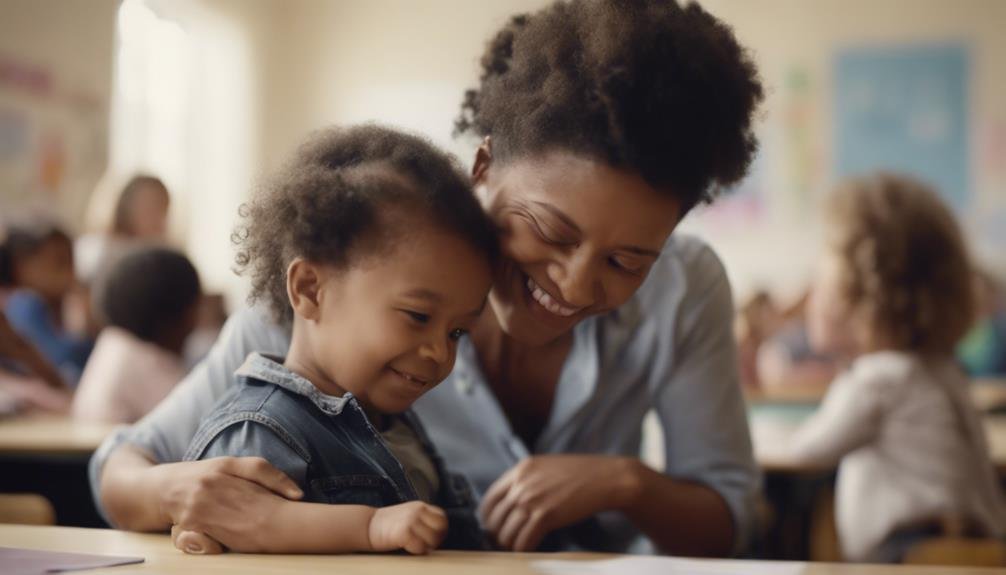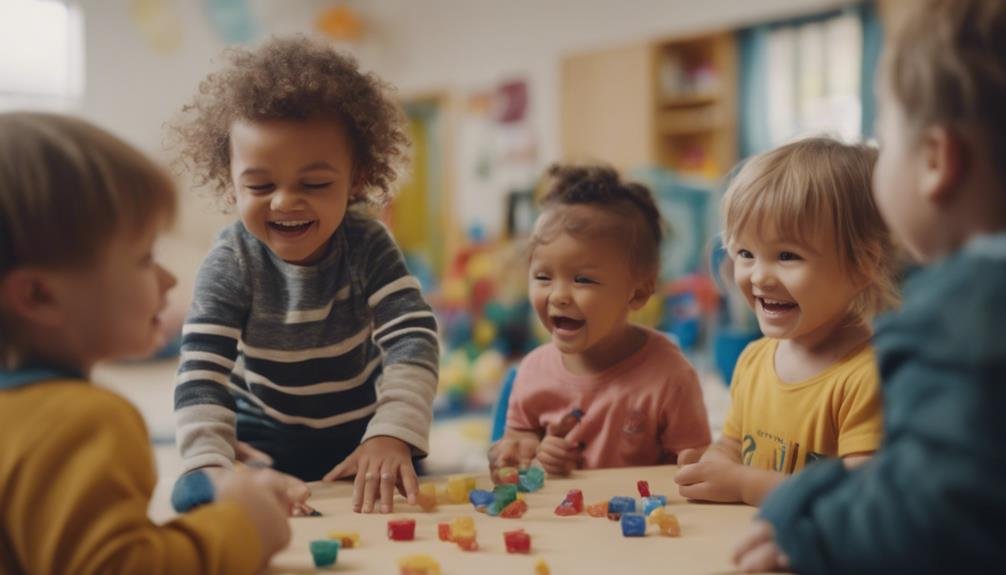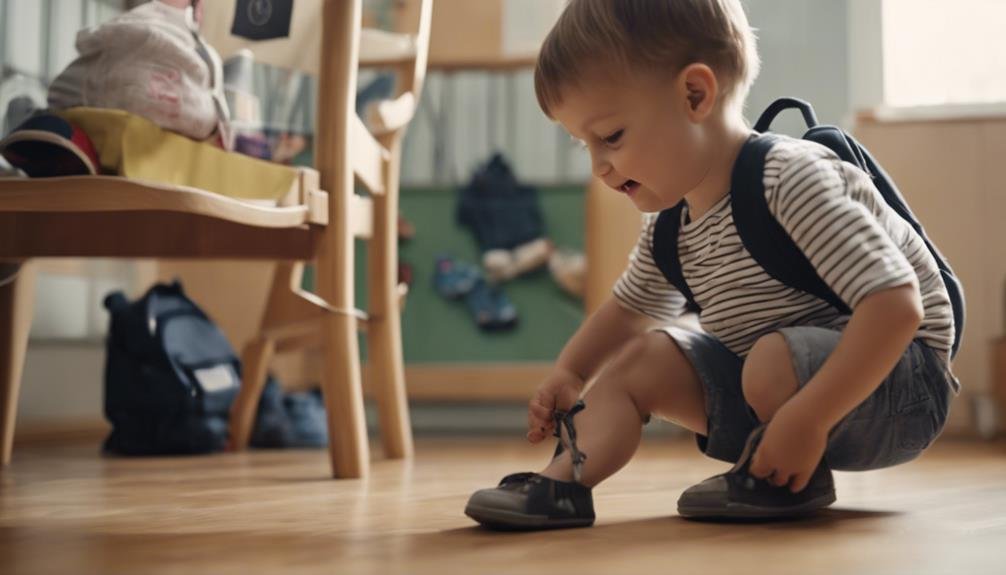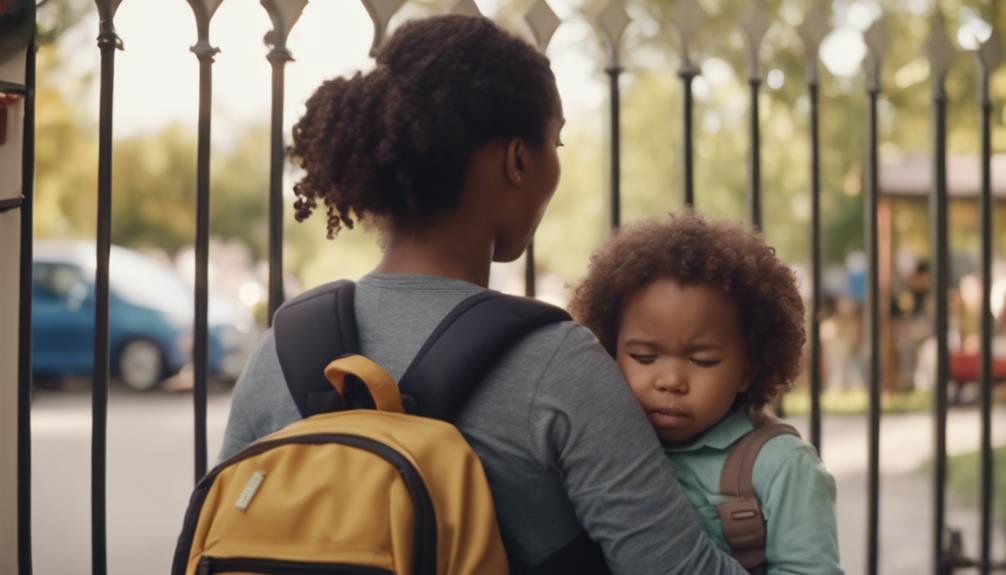"Cherishing Little Steps - A Haven for Baby and Family Journeys"
Preparing Your Toddler for Preschool: Emotional and Practical Tips
As you prepare your toddler for preschool, you'll find that focusing on both emotional and practical aspects is key. Acknowledging their feelings and helping them build emotional resilience are crucial steps, but what about the practical side? How can you ensure they feel confident and ready for this new chapter in their life? By incorporating simple yet effective strategies, you can help ease the transition and set the stage for a positive preschool experience.
Key Takeaways
- Acknowledge and validate toddler's emotions to build emotional intelligence.
- Establish routines and visit preschool to create familiarity and comfort.
- Encourage socialization, independence, and positive peer interactions.
- Practice separation techniques gradually with communication and comfort.
- Build a support system, connect with parents, engage with teachers, and prioritize self-care.
Understanding Your Toddler's Emotions

Understanding your toddler's emotions can be a crucial step in preparing them for preschool. Toddlers experience a wide range of emotions as they navigate the world around them, from joy and excitement to frustration and fear. By acknowledging and validating these emotions, you can help your child develop important emotional intelligence skills that will serve them well in a preschool setting.
One key aspect of understanding your toddler's emotions is being present and attentive to their cues. Toddlers may not always have the words to express how they feel, so they rely on nonverbal signals like facial expressions, body language, and behavior. By tuning into these signals and responding with empathy, you can create a safe space for your child to explore and express their emotions.
Additionally, teaching your toddler simple emotional vocabulary can empower them to articulate their feelings more effectively. For example, labeling emotions like 'happy,' 'sad,' 'frustrated,' or 'scared' can help your child make sense of their internal world and communicate their needs more clearly. Remember, emotional intelligence is a skill that can be nurtured and developed over time, so be patient and supportive as your toddler learns to navigate their feelings.
Establishing a Routine at Home
Are you ready to create a structured routine at home that will help prepare your toddler for preschool success? Establishing a consistent daily schedule can provide a sense of security and stability for your little one as they transition into a new environment.
Here are some tips to help you establish a routine at home:
- Set Regular Wake-Up and Bedtimes: Consistency in sleep schedules can regulate your toddler's body clock and ensure they're well-rested for their preschool activities.
- Designate Specific Meal Times: Having set meal times can help your child develop healthy eating habits and provide structure to their day.
- Incorporate Play and Learning Activities: Schedule time for both play and educational activities to stimulate your toddler's development and creativity.
- Establish Daily Routines: Create a predictable sequence of events for activities like getting dressed, brushing teeth, and reading bedtime stories to promote independence and organization skills.
Introducing Socialization Skills

To help your toddler develop essential socialization skills, encourage interactive play with other children in supervised settings. These interactions provide valuable opportunities for your little one to learn how to share, take turns, and communicate effectively. Encouraging your child to engage with their peers can boost their confidence and help them understand the importance of cooperation.
During playdates or at the park, gently guide your toddler in navigating social situations. Encourage them to introduce themselves, ask for a turn on the swing, or share a toy with a friend. These small interactions lay the foundation for more complex social skills they'll need in preschool and beyond.
Additionally, modeling positive social behavior yourself can have a significant impact on your child. Show them how to greet others politely, express gratitude, and resolve conflicts peacefully. By observing your actions, your toddler can learn valuable lessons on how to interact with others in a kind and respectful manner.
Familiarizing With Preschool Environment
As you prepare your toddler for preschool, easing them into the new environment can be done by gradually introducing them to the setting and routines of the preschool. Familiarizing your child with the preschool environment is essential for a smooth transition. Here are some tips to help your toddler adjust comfortably:
- Visit the Preschool: Take your child for a visit to the preschool before their first day. This will help them become familiar with the classrooms, play areas, and other children.
- Meet the Teachers: Introduce your toddler to their teachers. Building a rapport with the teachers will make your child feel more secure and supported in the new environment.
- Talk About Preschool: Discuss what preschool will be like with your child. Use positive language and highlight the fun activities they'll get to do.
- Practice Routines: Start practicing preschool routines at home, such as following a schedule for meals, naps, and playtime. This will help your toddler adjust to the structured environment of preschool.
Encouraging Independence and Confidence

Encouraging your toddler's independence and confidence is crucial for their growth and development as they prepare for preschool. By allowing them to do simple tasks on their own, like picking out their clothes or putting away toys, you're helping them build self-reliance and a sense of accomplishment. Praise their efforts, even if they're small, to boost their self-esteem and encourage them to try new things.
Another way to foster independence is by giving them choices. Let them choose between two options, like which snack to have or which book to read. This helps them feel empowered and in control of their decisions, boosting their confidence.
It's important to resist the urge to constantly intervene or do things for them. Instead, offer guidance and support as they navigate tasks independently. Remember, building independence is a gradual process, so be patient and celebrate their milestones along the way. Your encouragement and support will help them feel more confident and capable as they transition to preschool.
Communicating Openly With Your Child
Help your toddler express their thoughts and feelings by creating an environment where open communication is valued and encouraged. It's essential to establish a safe space where your child feels comfortable sharing their emotions and experiences with you. Here are some tips to foster open communication with your toddler:
- Active Listening: Take the time to actively listen to what your child is saying without judgment or interruption. Show genuine interest in their words and feelings.
- Encouragement: Praise your child for expressing themselves, even if it's just a simple emotion like being happy or sad. This positive reinforcement will encourage them to continue sharing with you.
- Use Simple Language: Tailor your communication to your toddler's level. Use simple words and phrases to help them understand and express themselves more effectively.
- Ask Open-Ended Questions: Instead of yes or no questions, try asking open-ended questions that encourage your child to elaborate on their thoughts and feelings. This can lead to deeper conversations and strengthen your bond.
Practicing Separation Techniques

To help your toddler adjust to preschool, start practicing separation techniques gradually to ease the transition for both of you. Begin by leaving your child with a trusted caregiver for short periods, gradually increasing the time apart. This will help your toddler become more comfortable with the idea of being away from you.
When saying goodbye, keep your tone positive and reassuring, as children can pick up on your emotions. Create a goodbye routine, such as a special hug or a secret handshake, to provide comfort and consistency during departures.
Encourage your little one to express their feelings about separation and reassure them that you'll always come back. Validate their emotions and offer words of comfort to help them feel understood. It's essential to remain consistent with your departure routine to establish a sense of security for your child.
Building a Support System
Establishing a solid support system is crucial for both you and your toddler as they prepare for preschool. Transitioning to a new environment can be overwhelming, but having a strong support network can make a significant difference in your child's adjustment.
Here are some ways to build a support system:
- Connect with Other Parents: Reach out to parents whose children will also be attending the same preschool. Sharing experiences and tips can help both you and your toddler feel more at ease.
- Engage with Teachers: Building a positive relationship with your child's teachers can provide valuable insights into your toddler's progress and well-being at school.
- Lean on Family and Friends: Don't hesitate to ask for help or advice from loved ones. Having a reliable support system outside of school can offer comfort during this transition.
- Join Parenting Groups: Participating in parenting groups or online communities can connect you with others going through similar experiences, providing a sense of camaraderie and understanding.
Frequently Asked Questions
How Do I Handle My Toddler's Separation Anxiety on the First Day of Preschool?
Handling your toddler's first day of preschool separation anxiety involves reassurance, creating routines, and positive associations with school. Stay calm, provide comfort, and be patient. Celebrate small victories together. Remember, each child is unique, and it's okay to feel emotional.
What Should I Do if My Child Refuses to Interact With Other Kids at Preschool?
If your child refuses to interact with others at preschool, start by gently encouraging small interactions. Offer support and praise for any effort. Gradually expose them to social situations, and consider seeking guidance from teachers or professionals.
Is It Normal for My Toddler to Have Bathroom Accidents at Preschool?
It's common for toddlers to have bathroom accidents at preschool as they adjust to new routines and environments. Stay patient and supportive, offering reminders and encouragement. Communicate with teachers to ensure a positive and understanding approach to help your child.
How Can I Help My Child Cope With Not Being the Center of Attention at Preschool?
It's essential to validate your child's feelings about not being the center of attention at preschool. Encourage them to express emotions, engage in small group activities, and reassure them of your love and support.
What Should I Do if My Toddler Is Not Adjusting Well to the New Preschool Routine?
If your toddler is struggling with the new preschool routine, try establishing a consistent daily schedule at home to provide stability. Encourage open communication, validate their feelings, and offer reassurance. Remember, it's normal for adjustment to take time.
Conclusion
As you prepare your toddler for preschool, remember that you're laying the foundation for their future growth and development. Just like a gardener tends to their seedling with care and patience, nurturing your child's emotional well-being and supporting their transition will help them blossom into confident learners.
Keep watering their curiosity, fertilize their independence, and watch them bloom in the garden of education. Remember, you're their guiding light on this exciting journey.


